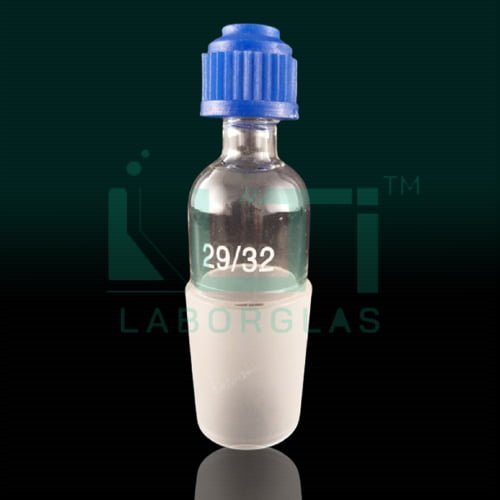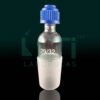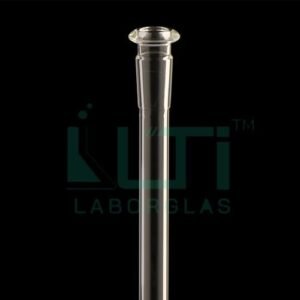Acc. to DIN 12257 and in addition to DIN standard, conical ground sockets and cones,
material: BOROSILICATE Glass 3.3
| PART No. | GL THREAD | NS MALE size | Pack(Qty) |
| 2340-14M | 14 | 14/23 | 10 |
| 2340-19M | 14 | 19/26 | 10 |
| 2340-24M | 14 | 24/29 | 10 |
| 2340-29M | 14 | 29/32 | 10 |
| 2340-14M-A | 18 | 14/23 | 10 |
| 2340-19M-A | 18 | 19/26 | 10 |
| 2340-24M-A | 18 | 24/29 | 10 |
| 2340-29M-A | 18 | 29/32 | 10 |
| 2340-19M-B | 25 | 19/26 | 10 |
| 2340-24M-B | 25 | 24/29 | 10 |
| 2340-29M-B | 25 | 29/32 | 10 |
| 2340-24M-C | 32 | 24/29 | 10 |
| 2340-29M-C | 32 | 29/32 | 10 |
Here are potential uses in a laboratory setting:
- Glassware Connections:
- The reduction screwthread with cone adapter can be used to connect glassware components with different joint sizes, facilitating a secure and leak-tight connection between the parts.
- Fractional Distillation:
- In fractional distillation setups, the adapter may be used to connect the distillation flask with the column or other components, accommodating different joint sizes.
- Vacuum Applications:
- This adapter can be employed in vacuum setups, connecting glassware components and ensuring a tight seal for vacuum applications such as vacuum filtration or vacuum distillation.
- Chemical Reactions:
- In chemical reactions, the reduction screwthread with cone adapter allows for the connection of different reaction vessels or components, facilitating controlled mixing or addition of reagents.
- Laboratory Plumbing:
- The adapter contributes to the laboratory plumbing system, providing a versatile connection for various glassware components with different joint sizes.
- Connecting Accessories:
- It can be used to connect various accessories such as condensers, adapters, or other glassware components that may have different joint sizes.
- Versatile Experimental Setups:
- The adapter allows for flexibility in experimental setups, accommodating different laboratory configurations and facilitating connections between components.
- Standardization:
- Following DIN or other relevant standards ensures compatibility and standardization in laboratory procedures, allowing for the interchangeability of glassware components.







